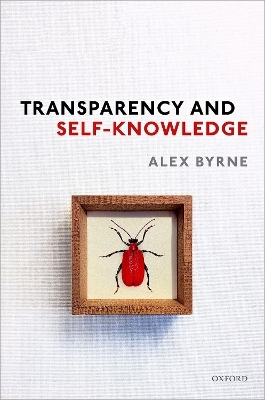
Transparency and Self-Knowledge
Seiten
2018
Oxford University Press (Verlag)
978-0-19-882161-8 (ISBN)
Oxford University Press (Verlag)
978-0-19-882161-8 (ISBN)
You know what someone else is thinking and feeling by observing them. But how do you know what you are thinking and feeling? This is the problem of self-knowledge: Alex Byrne tries to solve it. The idea is that you know this not by taking a special kind of look at your own mind, but by an inference from a premise about your environment.
Alex Byrne sets out and defends a theory of self-knowledge-knowledge of one's mental states. Inspired by Gareth Evans' discussion of self-knowledge in his The Varieties of Reference, the basic idea is that one comes to know that one is in a mental state M by an inference from a worldly or environmental premise to the conclusion that one is in M. (Typically the worldly premise will not be about anything mental.) The mind, on this account, is 'transparent': self-knowledge is achieved by an 'outward glance' at the corresponding tract of the world, not by an 'inward glance' at one's own mind. Belief is the clearest case, with the inference being from 'p' to 'I believe that p'. One serious problem with this idea is that the inference seems terrible, because 'p' is at best very weak evidence that one believes that p. Another is that the idea seems not to generalize. For example, what is the worldly premise corresponding to 'I intend to do this', or 'I feel a pain'? Byrne argues that both problems can be solved, and explains how the account covers perception, sensation, desire, intention, emotion, memory, imagination, and thought. The result is a unified theory of self-knowledge that explains the epistemic security of beliefs about one's mental states (privileged access), as well as the fact that one has a special first-person way of knowing about one's mental states (peculiar access).
Alex Byrne sets out and defends a theory of self-knowledge-knowledge of one's mental states. Inspired by Gareth Evans' discussion of self-knowledge in his The Varieties of Reference, the basic idea is that one comes to know that one is in a mental state M by an inference from a worldly or environmental premise to the conclusion that one is in M. (Typically the worldly premise will not be about anything mental.) The mind, on this account, is 'transparent': self-knowledge is achieved by an 'outward glance' at the corresponding tract of the world, not by an 'inward glance' at one's own mind. Belief is the clearest case, with the inference being from 'p' to 'I believe that p'. One serious problem with this idea is that the inference seems terrible, because 'p' is at best very weak evidence that one believes that p. Another is that the idea seems not to generalize. For example, what is the worldly premise corresponding to 'I intend to do this', or 'I feel a pain'? Byrne argues that both problems can be solved, and explains how the account covers perception, sensation, desire, intention, emotion, memory, imagination, and thought. The result is a unified theory of self-knowledge that explains the epistemic security of beliefs about one's mental states (privileged access), as well as the fact that one has a special first-person way of knowing about one's mental states (peculiar access).
Alex Byrne is chair of the philosophy section at MIT. His main interests are philosophy of mind (especially perception and consciousness), epistemology (especially self-knowledge), metaphysics (especially color), and problems concerning sex and gender. He has written a number of papers on color with David Hilbert of the University of Illinois at Chicago; they also edited the two-volume collection Readings on Color for MIT Press. He recently co-edited The Norton Introduction to Philosophy, now on its second edition.
1: Problems of Self-Knowledge
2: Inner Sense
3: Some Recent Approaches
4: The Puzzle of Transparency
5: Belief
6: Perception and Sensation
7: Desire, Intention, and Emotion
8: Memory, Imagination, and Thought
| Erscheinungsdatum | 27.04.2018 |
|---|---|
| Verlagsort | Oxford |
| Sprache | englisch |
| Maße | 164 x 241 mm |
| Gewicht | 515 g |
| Themenwelt | Geisteswissenschaften ► Philosophie ► Erkenntnistheorie / Wissenschaftstheorie |
| ISBN-10 | 0-19-882161-1 / 0198821611 |
| ISBN-13 | 978-0-19-882161-8 / 9780198821618 |
| Zustand | Neuware |
| Haben Sie eine Frage zum Produkt? |
Mehr entdecken
aus dem Bereich
aus dem Bereich
die Grundlegung der modernen Philosophie
Buch | Softcover (2023)
C.H.Beck (Verlag)
18,00 €
Buch | Softcover (2023)
Reclam, Philipp (Verlag)
7,00 €


![Was heißt Denken?. Vorlesung Wintersemester 1951/52. [Was bedeutet das alles?] - Martin Heidegger](/media/113619842)